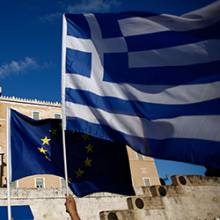Greece and Puerto Rico: Lessons for America

Gingrich Productions
July 1, 2015
Newt Gingrich
To receive Newt’s weekly newsletters, click here.
Greece will hold a referendum on Sunday to decide whether it will stay in the Eurozone or leave it. Staying in the Eurozone will require Greeks to accept very harsh austerity cutbacks and reforms. Dropping out of the Eurozone would lead to a radically devalued Greek drachma.
Other countries that have accepted devaluation have seen their currency decline in value by as much as 84 percent. That means everything they import costs dramatically more and everything they export brings in less. For American and European customers, it would be a huge benefit, since staying in Greek hotels, eating in Greek restaurants, and buying Greek goods would be drastically cheaper.
Greece has forced itself into this position after years of living beyond its means. The country has too many bureaucrats, pensions that are unsustainable, regulations that kill jobs, and people who want to spend more than they earn.
Generations of irresponsible politicians have encouraged this habit of living beyond their incomes and spending more than they earn.
The Greek crisis has been building for years. Now it is being paralleled by a Puerto Rican crisis.
The Governor of Puerto Rico has announced that his island government owes $70 billion and can’t possibly repay its debt. He would like Washington to bail him out.
All of the bondholders who foolishly lent money to an insolvent government agree on the need for the bailout. After all, why should they have to pay for their lack of due diligence?
Back in January of 2011, Governor Jeb Bush and I wrote an op-ed for the Los Angeles Times addressing just this situation. It was titled, “Better off Bankrupt: States Should Have the Option of Bankruptcy Protection to Deal with Their Budget Crises“.
Congress and the President should work together to pass a federal bankruptcy law for the states and territories. The best next step for Puerto Rico is to accept that it has borrowed more than it can possibly repay and then to go through a systematic bankruptcy. This will force all of the stakeholders, government employees, pensioners and bondholders to lose some money to solve the problem.
The Greek and Puerto Rican problems, like the Illinois problem before them, are symptoms of an era in which people and governments have self-indulgently spent more money than they have earned.
Our student loan disaster is another symptom of this same habit.
Once upon a time, students worked, lived frugally, and studied hard to get through school as quickly as possible. Universities, students, and politicians all found it mutually useful to make school last longer and cost more money–it was easier to borrow from the future to pay for a softer, more carefree present. Now, just as in Greece and Puerto Rico, the results of these bad choices are beginning to crop up as overburdened graduates find themselves drowning in debt. It’s a tragedy for the students, just as it’s a tragedy for the Greeks, who will now live poorer lives because of a government and a culture that promised them it would all be okay.
It is time to get back to a balanced budget for our government and our society.
We have to learn once again to earn more than we spend, put some aside for a rainy day, and invest in our future, our children’s future and our country’s future.
Remember those principles as you watch the Greek and Puerto Rican dramas unfold.
Copyright © 2013 Gingrich Productions. All rights reserved
http://www.gingrichproductions.com/2015/07/greece-and-puerto-rico-lessons-for-americans